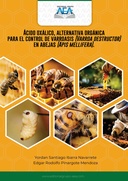Explore

Ácido oxálico, alternativa orgánica para el control de varroasis (Varroa destructor) en abejas (Apis mellifera)
0 Ungluers have
Faved this Work
Login to Fave
The document entitled "Oxalic acid, an organic alternative for the control of varroasis (Varroa destructor) in bees (Apis mellifera)" exposes the relevance of beekeeping in Latin America, particularly in Ecuador, highlighting its economic contribution through products such as honey, wax, pollen, propolis and Apitoxin. The research focuses on the Varroa destructor mite, a parasite harmful to bees, which affects both brood and adults, weakening and potentially leading to the death of hives. The study highlights the importance of using organic products to control Varroasis, with oxalic acid being one of the most effective. This compound, naturally present in certain plants and in honey, has been shown to be highly effective in controlling Varroa, especially in non-breeding periods, achieving an efficacy of more than 90%. The methodology of the study included bibliographic and field research, carried out in the Aguas Frias compound in the province of Los Rios, Canton Mocache, during November and December 2018. Analytical and deductive methods were employed to study the presence of the Varroa destructor mite in Apis mellifera bee hives, using primary and secondary sources. The experiment involved the management of 20 hives, evaluating five different treatments in four replicates, with applications of oxalic acid and amitraz to determine mite population and hive condition over five weeks.
This book is included in DOAB.
Why read this book? Have your say.
You must be logged in to comment.
Rights Information
Are you the author or publisher of this work? If so, you can claim it as yours by registering as an Unglue.it rights holder.Downloads
This work has been downloaded 65 times via unglue.it ebook links.
- 38 - pdf (CC BY-NC-SA) at Unglue.it.
- 27 - pdf (CC BY-NC-SA) at Unglue.it.
Keywords
- Acaro
- Amitraz
- Costos
- Efectividad tratamientos
- población
Links
DOI: 10.55813/egaea.l.2022.63Editions

